Though, I am not particularly a die-hard fan of anime; however, there’s one that I’m crazy about even today : the Rurouni Kenshin, aka, the Samurai-X anime series; which is about a former vicious and deadly samurai warrior named Himura Kenshin who has given up killing and uses a reverse-bladed sword just to defend himself and the innocents. And, even with the reverse-bladed sword, he was unstoppable – only this time he wouldn’t kill anyone but still defeats every opponent. I remember how eager I waited for Tuesday to come, when it was shown on the television. After the internet came to my hand, one of the first things I did was downloading the 95 episodes of the cartoon series and all the movies – I’ve watched each episode and movie at least 3 times – such is my devotion to the series.
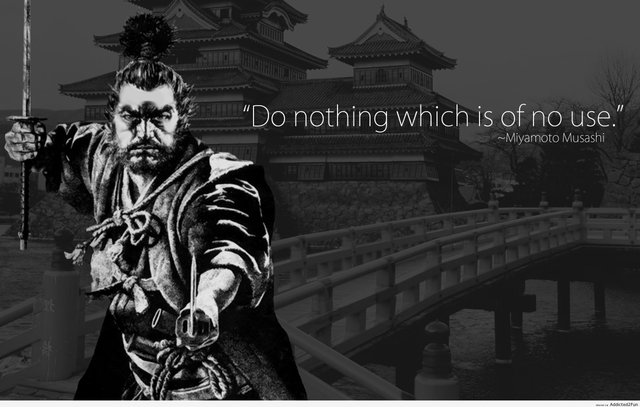
source
The series did one more thing, it had triggered my profound fascination for the samurai culture and I always try to know whatever I can about this amazing culture. On the way to satisfy my thirst for knowledge about samurais – I’ve found a character named Miyamoto Musashi , who is so similar to Himura that I thought for a time that he was actually Himura’s inspiration – Like the fictional Khensin Himura, Miyamoto had also given up fighting and devoted his life in meditation, philosophy and art. However, I couldn’t find any hard proof of that. Instead, i came to know that Himura was actually based-on another legendary samurai named Kawakami Gensai I’ll do an article on him some other time – for now, let’s dig into the life of Miyamoto Musashi – the samurai swordsman who had never lost a single fight in his lifetime.
Miyamoto Musashi was the strongest and most famous samurai in Japan. The most important book on Japanese martial art, the "Book of Five Rings", was written by him – the book is so profound in tactics, strategy,and philosophy that it is still studied by martial artists and battle strategists today. But not only that, the guy was so genius that he even created a fighting style, known as Niten Ichi Ryu.

source
He is called to this day by his disciples as Sensei Musashi. The samurai was born in the year 1584 and died in 1645. Throughout his life he had about 60 duels. But it was not simple duels; in fact, he fought the greatest warriors of the day, and defeated them all.
According to his book, at only 13 years old, he had his first duel. As a child, the samurai was called Shinmen Bennosuke. He had learned Kenjutsu, a fighting style with swords from his father, Shinmen Hirata Munisai – a notable samurai warrior in his days. Hirata Munisai was granted the title of “Unrivaled under Heaven” by then-Shogun of japan (title of military dictators of japan from 1185 to 1868) for defeating the master of Yoshioka School 2 out of three rounds in a duel. (I’ll tell you more about the Yoshioka School later in this article, it has much to do with Musashi) It is said that he was mean to his son, never showed what can be called ‘fatherly love’. When Musashi was a boy of 9 or 10, his father had either died or abandoned him (historians have doubts about what happened exactly).
Here’s a glance about his first fights in his own writing:
“I have trained in the way of strategy since my youth, and at the age of thirteen I fought a duel for the first time. My opponent was called Arima Kihei, a sword adept of the Shinto ryū, and I defeated him. At the age of sixteen I defeated a powerful adept by the name of Akiyama, who came from Tajima Province. At the age of twenty-one I went up to Kyōtō and fought duels with several adepts of the sword from famous schools, but I never lost.”
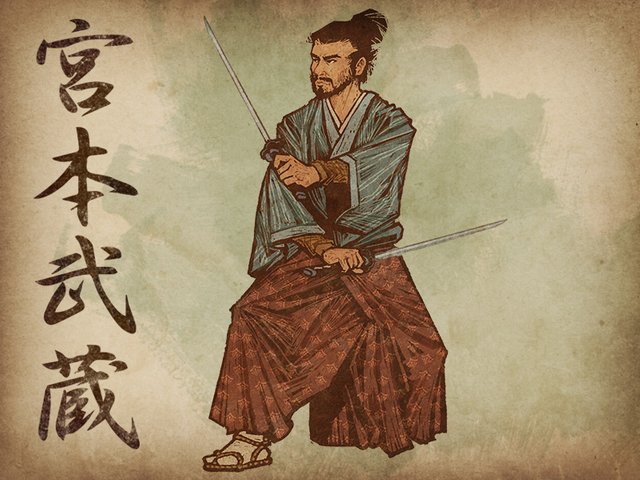
[Miyamoto Musashi: illustration] - source
Rising to Fame:
In 1599, at the age of 16, he left his home. He travelled around and engaged in duels with legendary fighters such as Tadashima Akiyama.
In the year 1600, two major clans of then-Japan the Tokugawa and the Toyotomi Clan engaged in a war. Musashi joined the Toyotomi army (otherwise known as the ‘army of the west’) since the Shinmen clan joined the Toyotomis and Musansi’s family had sworn allegiance to Shinmens. Although, the Toyotomi clan lost the war, Mnsashi had proven himself as a skilled and vicious warrior. According to the Book of Five Rings, he took part in six battles including the famous Battle of Sekigahara.
After the war, the great samurai had been lost from the picture for a while. He appeared in Kyoto at his 20/21 years of age, and started a series of duels versus the famous Yoshioka School. The Yoshioka was the top one of the eight major schools of martial arts in Kyoto. According to the legends, the eight founders of those eight schools were students of a legendary master resided on the sanctified Mount Kurama. Yoshioka family claims that there was only one duel took place between Musashi and one of their own. His name was Yoshioka Kenpō, who was defeated by Musashi. However, other some other accounts say that Musashi also challenged Yoshioka Seijūrō in 1604. Seijūrō accepted the challenge, and on March 8th, 1604, they faced each other in a duel at the northern part of Kyoto. Musashi arrived significantly late from the agreed time in order to annoy and anger the Yoshioka master. Once they engaged in the duel, Musashi crippled his left arm with a single blow of a sword curved out of an oar! (that’s right, he didn’t even used a real sword – that was his one of his prime strategies: catching the opponent by surprise). Seijūrō could no longer carry out his duties as the head of the school, and he passed the headship on his brother Yoshioka Denshichirō – who was equally accomplished as him. Denshichirō challenged Musashi out of rage. Musashi accepted the challenge and they met outside a Kyoto temple called Sanjūsangen-dō. Denshichirō exerted a weapon featured still rod with still ball attached to it with chains, which he was disarmed of by Musashi and, needless to say, got defeated, outraging his Yoshioka family making Yoshioka Matashichiro, a boy of 12, the head of the family. Matashichiro sworn to take revenge and challenged Musashi to a duel, but secretly assembled a force featuring swordsmen, musketeers and archers to kill him. However, this time, Musashi took them by surprise by breaking his habit of late arrival. He came a few hours early to the chosen ground, which was near the Ichijō-ji temple outside of Kyoto. Hiding, he saw the forces coming to get him, and instead of fleeing, he attacked the force by himself and killed Matashichiro. After making the killing, he had to fight off dozens of soldiers, and he used two swords to defend himself against the large force – marking the start of his own Niten’ichi sword fighting technique. Defeating three reputed Yoshioka masters in a row and killing the last head of the school (not to mention, destroying the top martial arts school) – rose him to fame as a first-class master of the art of sword fighting.
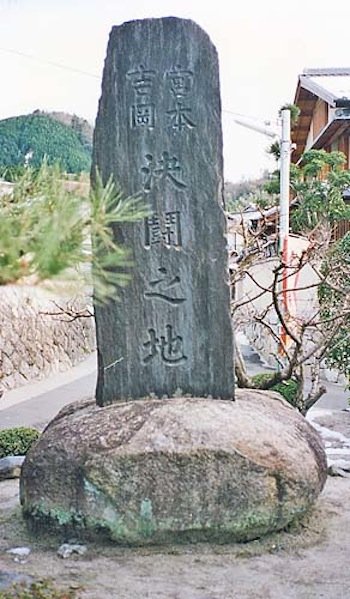
[The battle location between Musashi and the Yoshioka masters] - source
After leaving Kyoto, he travelled to Hōzōin in Nara and took lessons and engaged into duels with monks there. The monks of Hōzōin were renowned experts of lance weapons. Then he travelled all over Japan extensively from 1605 to 1612 in a musha shugyo (a samurai warrior's quest or pilgrimage) seeking knowledge and to hone his skills. He had many duels with reputed masters of martial arts along the way, not to mention won them all. One of the notable fights of this time was with a Kusarigama (see image below) master named Shishido Baiken, whom he defeated and killed. He also defeated another famous master named Muso Gonnosuke two times. It is said that he used bokkens (wooden swords, mostly used for practices) in actual duels!
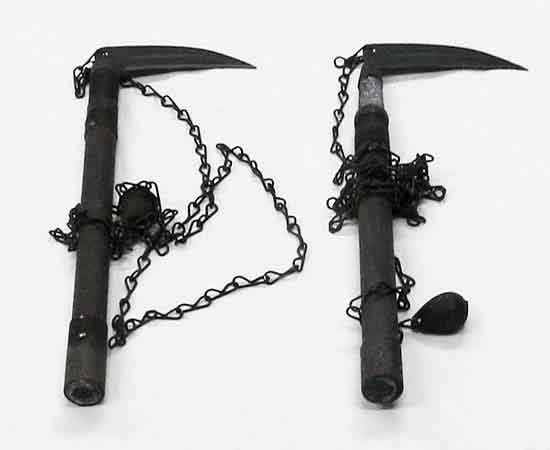
source
Probably the biggest duel of his life was with the famous and feared sword master Sasaki Kojirō
Who used a Nodachi (a Japanese great sword). Sasaki was known as “The Demon of the Western Provinces". The duel was arranged by Nagaoka Sado, feudatory of the powerful lord named Hosokawa Tadaoki. According to some experts, the duel had political motivation as it would consolidate Tadoki’s control over his feoff.
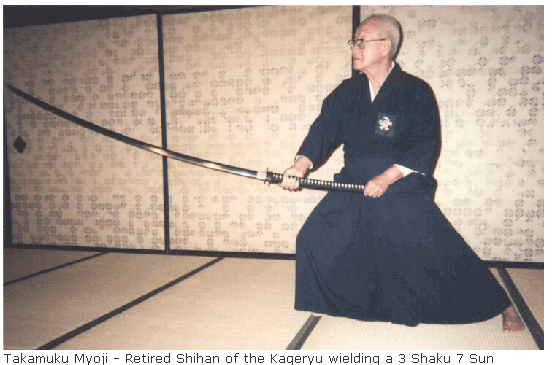
[nodachi] - source
On April 13th of 1612, the duel between Musashi and Sasaki took place in the Funajima island. Musashi killed the “Demon of Western Provinces” with a bokken known to have been made of an oar! After defeating Sasaki, he didn’t stop fighting, and defeated many other reputed martial arts champions.
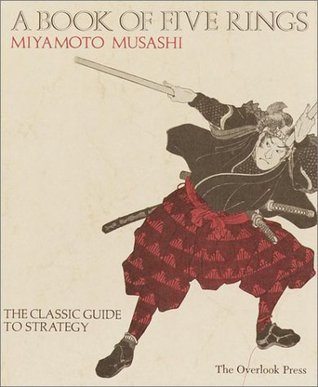
source
The great samurai is said to have been in 60 duels undefeated; however, it is assumed that the deaths by his hand in the big battles hasn’t been included in this 60 duels!
Last Days and Death:
Miyamoto Musashi was a guest of his friend Hosokawa Tadatoshi in his last days of life. At that time, he wrote the "35 articles on the art of Kenjutsu." After that, he isolated himself in Reigando's cave. There the legendary samurai dedicated himself to meditation and the practice of his art along with his writing. In this cave, he wrote the famous "Book of Five Rings". Oh, i cannot forget to mention that he also dedicated himself to other arts, such as painting, sculpture and poetry.
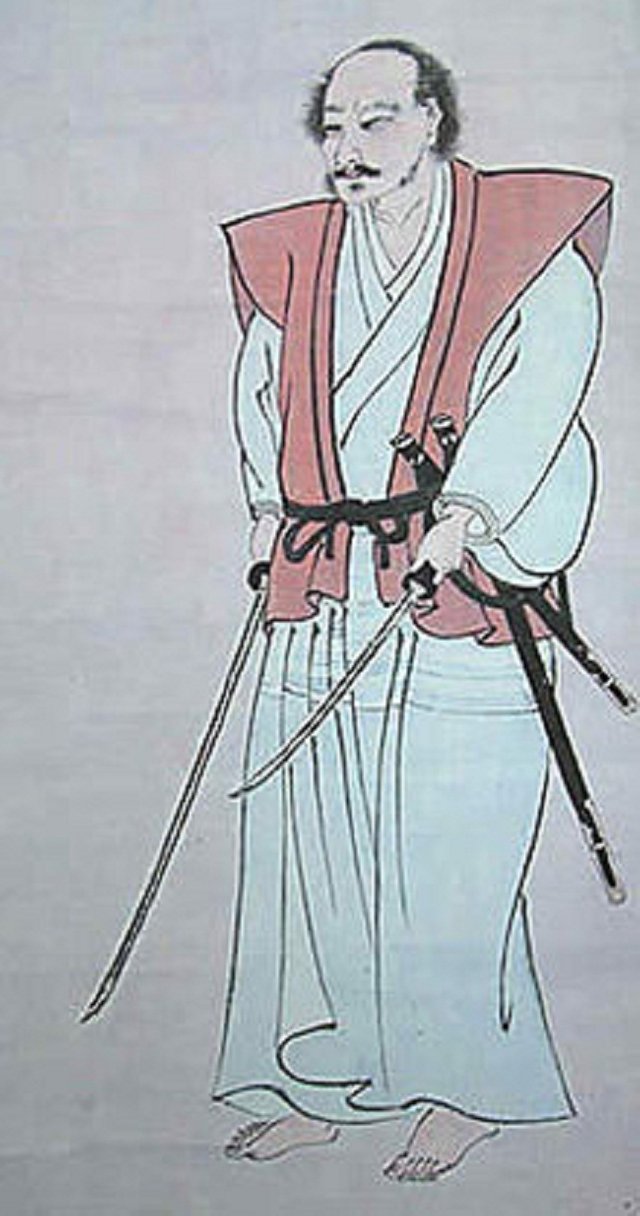
[self portrait drawn in 1640] - source
On June 13th, 1645, at the moment of his death, Musashi raised himself up, tightened his belt and put his sword in it. Then he seated vertically raising up one knee, holding a cane with is right hand, and his sword with the left hand – the traditional samurai posture. He took his last breath in this position like a true warrior. He was 62 at that moment, and believed to be died of thoracic cancer. On the command of Lord Hosokawa, his tomb was set up on the Mount Iwato.
Hi! I am a robot. I just upvoted you! Readers might be interested in similar content by the same author:
https://steemit.com/history/@tamurah/miyamoto-musashi-the-samurai-who-never-lost-a-fight-in-his-entire-life
Downvoting a post can decrease pending rewards and make it less visible. Common reasons:
Submit
There are countless movies and books on this guy, that I've watched and even now I am amazed at how awesome he was. I mean sword fighting in real life is different to fighting on the screen, in a few second your limbs could be chopped off or worse, you could be dead. Musashi is an example of superhuman.
Downvoting a post can decrease pending rewards and make it less visible. Common reasons:
Submit
Exactly bro 😊
Downvoting a post can decrease pending rewards and make it less visible. Common reasons:
Submit